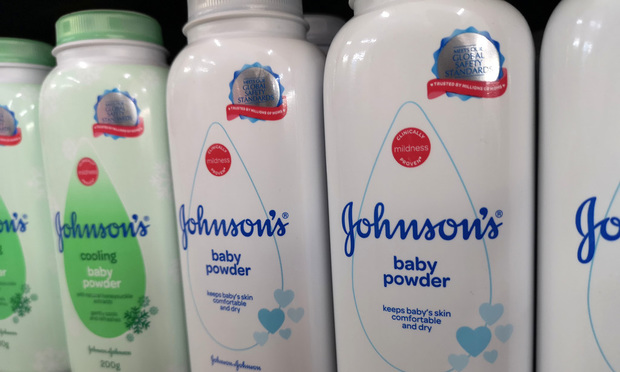First Georgia Talcum Powder Trial Against Johnson & Johnson Ends in Mistrial
On its third day of deliberations, the jury was deadlocked 10 to 2 in favor of the plaintiff, said one of the lawyers for Diane Brower's family. The trial alleged Johnson & Johnson's baby powder caused Brower's 2016 death from ovarian cancer.
October 08, 2019 at 05:06 PM
3 minute read

The first talcum powder trial in Georgia ended in a mistrial on Tuesday after the jury was deadlocked 10 to 2.
On its third day of deliberations, a jury in Fulton County State Court failed to reach a verdict in a case alleging Johnson & Johnson's talcum powder products caused a woman to die of ovarian cancer in 2016. Juries in Georgia have to reach unanimous verdicts in civil cases.
In a statement, plaintiffs attorney Ted Meadows of Beasley, Allen, Crow, Methvin, Portis & Miles in Montgomery, Alabama, called the trial's conclusion "unfortunate."
"The parties were told that the jury was divided 10-2 in favor of the plaintiff," he wrote. "Scientific studies and internal company documents show the liability of Johnson & Johnson and the link of baby powder use to ovarian cancer. We will continue to move forward with these important claims on behalf of ovarian cancer victims in venues across the nation."
Johnson & Johnson spokeswoman Jennifer Taylor wrote in a statement: "We sympathize with anyone suffering from cancer, and we understand patients and their families are seeking answers. We are grateful to the jury for their time and believe this outcome reflects the diligent review by the jurors of the facts in this case. We look forward to a new trial to present our defense, which rests on decades of independent, non-litigation driven scientific evaluations, none of which have found that Johnson's baby powder causes cancer."
Meadows and Allen Smith, of The Smith Law Firm in Ridgeland, Mississippi, represented the granddaughter and estate of Diane Brower, who claimed to have applied Johnson & Johnson's talcum powder products on her vaginal area for more than 15 years before stopping around 1980.
The trial began on Sept. 12. In closing arguments last week, Smith asked the jury to award more than $700,000 in lost wages and $1.3 million in medical bills, plus noneconomic damages for the 20 years she should have lived. Defense attorney James Smith of Blank Rome in Philadelphia attacked the plaintiffs' experts, calling their theories "junk science."
Meadows paired with Smith on several ovarian cancer trials in Missouri, one of which ended in a $4.7 billion verdict for 22 women last year.
Joining them on the plaintiff's team were Beasley Allen shareholders Leigh O'Dell, who is co-lead plaintiffs' counsel in the related multidistrict litigation against Johnson & Johnson in New Jersey, and Sharon Zinns and Robert Register, both of the Atlanta office. Jack Dodson of Nashville's Dickinson Wright, and Alexander Denton of Atlanta's The Robbins Firm, also worked on the case.
The defense team also included Sidley Austin's Debra Pole and Eric Schwartz, both in Los Angeles; Mark Hegarty at Shook, Hardy & Bacon in Kansas City, Missouri; and Thompson Hine's Z. Ileana Martinez and Leslie Suson, both in Atlanta. Pole, Smith and Hegarty have faced off against the same plaintiffs team before in Missouri talc trials.
Mistrials have been common in related cases alleging Johnson & Johnson's baby powder caused mesothelioma, while ovarian cancer cases have largely ended in substantial verdict awards, some of which have been reversed.
This content has been archived. It is available through our partners, LexisNexis® and Bloomberg Law.
To view this content, please continue to their sites.
Not a Lexis Subscriber?
Subscribe Now
Not a Bloomberg Law Subscriber?
Subscribe Now
NOT FOR REPRINT
© 2025 ALM Global, LLC, All Rights Reserved. Request academic re-use from www.copyright.com. All other uses, submit a request to [email protected]. For more information visit Asset & Logo Licensing.
You Might Like
View All
'Didn't Notice Patient Wasn't Breathing': $13.7M Verdict Against Anesthesiologists
12 minute read
Trial Court Had No Authority to Reopen Voir Dire After Jury Impaneled in Civil Case, State Appellate Court Rules

'Pushed Into Oncoming Traffic': $5.85M Settlement in Mediated Auto Tort
6 minute readTrending Stories
- 1Goodwin Procter Relocates to Renewable-Powered Office in San Francisco’s Financial District
- 2'Didn't Notice Patient Wasn't Breathing': $13.7M Verdict Against Anesthesiologists
- 3'Astronomical' Interest Rates: $1B Settlement to Resolve Allegations of 'Predatory' Lending Cancels $534M in Small-Business Debts
- 4Senator Plans to Reintroduce Bill to Split 9th Circuit
- 5Law Firms Converge to Defend HIPAA Regulation
Who Got The Work
J. Brugh Lower of Gibbons has entered an appearance for industrial equipment supplier Devco Corporation in a pending trademark infringement lawsuit. The suit, accusing the defendant of selling knock-off Graco products, was filed Dec. 18 in New Jersey District Court by Rivkin Radler on behalf of Graco Inc. and Graco Minnesota. The case, assigned to U.S. District Judge Zahid N. Quraishi, is 3:24-cv-11294, Graco Inc. et al v. Devco Corporation.
Who Got The Work
Rebecca Maller-Stein and Kent A. Yalowitz of Arnold & Porter Kaye Scholer have entered their appearances for Hanaco Venture Capital and its executives, Lior Prosor and David Frankel, in a pending securities lawsuit. The action, filed on Dec. 24 in New York Southern District Court by Zell, Aron & Co. on behalf of Goldeneye Advisors, accuses the defendants of negligently and fraudulently managing the plaintiff's $1 million investment. The case, assigned to U.S. District Judge Vernon S. Broderick, is 1:24-cv-09918, Goldeneye Advisors, LLC v. Hanaco Venture Capital, Ltd. et al.
Who Got The Work
Attorneys from A&O Shearman has stepped in as defense counsel for Toronto-Dominion Bank and other defendants in a pending securities class action. The suit, filed Dec. 11 in New York Southern District Court by Bleichmar Fonti & Auld, accuses the defendants of concealing the bank's 'pervasive' deficiencies in regards to its compliance with the Bank Secrecy Act and the quality of its anti-money laundering controls. The case, assigned to U.S. District Judge Arun Subramanian, is 1:24-cv-09445, Gonzalez v. The Toronto-Dominion Bank et al.
Who Got The Work
Crown Castle International, a Pennsylvania company providing shared communications infrastructure, has turned to Luke D. Wolf of Gordon Rees Scully Mansukhani to fend off a pending breach-of-contract lawsuit. The court action, filed Nov. 25 in Michigan Eastern District Court by Hooper Hathaway PC on behalf of The Town Residences LLC, accuses Crown Castle of failing to transfer approximately $30,000 in utility payments from T-Mobile in breach of a roof-top lease and assignment agreement. The case, assigned to U.S. District Judge Susan K. Declercq, is 2:24-cv-13131, The Town Residences LLC v. T-Mobile US, Inc. et al.
Who Got The Work
Wilfred P. Coronato and Daniel M. Schwartz of McCarter & English have stepped in as defense counsel to Electrolux Home Products Inc. in a pending product liability lawsuit. The court action, filed Nov. 26 in New York Eastern District Court by Poulos Lopiccolo PC and Nagel Rice LLP on behalf of David Stern, alleges that the defendant's refrigerators’ drawers and shelving repeatedly break and fall apart within months after purchase. The case, assigned to U.S. District Judge Joan M. Azrack, is 2:24-cv-08204, Stern v. Electrolux Home Products, Inc.
Featured Firms
Law Offices of Gary Martin Hays & Associates, P.C.
(470) 294-1674
Law Offices of Mark E. Salomone
(857) 444-6468
Smith & Hassler
(713) 739-1250







